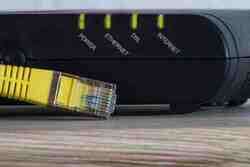How to crimp a RJ45 cable?

The RJ45 cable is a standard cable which has four twisted pairs of colors. It is easy to crimp a RJ45 cable and make it into a straight cable or cross the cable as required. To make a straight cable, the ends must be crimped in the same way at each end. When making a crossover cable, some wires of certain colors have to be reversed. Learning how to crimp a RJ45 cable and making straight and cross cables prove to be useful as different types of wires of varied lengths are required to build a network.
What you need?
A reasonable length FTP cable
Two RJ45 tips
A clip crimp
How to proceed?
Strip the cable to 2 cm at each end and separate the strands.
They are usually divided into 4 twisted pairs of colors:
Orange / orange-white
Green / green-white
Blue / white and blue
Brown / brown-white
Making a straight cable
To make a straight cable, the tips must be crimped typically the same way at each end by respecting the twisted pair size.
In general, the code used is:
1) orange-white
2) orange
3) green-white
4) Blue
5) blue-white
6) Green
7) brown-white
8) brown
Making a crossover cable
For a crossover cable, swap 1 with 3, and 2 with 6, in the list above. This gives:
1) green-white
2) green
3) orange and white
4) Blue
5) blue-white
6) orange
7) brown-white
8) brown
The standard EIA / TIA 568 (A & B)
Straight cable
1) white-green / white-green
2) green / green
3) white-orange / white-orange
4) Blue / blue
5) white-blue / white-blue
6) Orange / orange
7) white-brown / white-brown
8) brown / brown
For crossover cable 10/100baseT
1) white-green / white-orange
2) Green / orange
3) white-orange / white-green
4) Blue / blue
5) white-blue / white-blue
6) Orange / green
7) white-brown / white-brown
8) brown / brown
To complete crossover cable or cross gigabit
On Gbic 1000BaseT eg
1) white-green / white-orange
2) Green / orange
3) white-orange / white-green
4) Blue / white-brown
5) white-blue / brown
6) Orange / green
7) white-brown / blue
8) Brown / white-blue
Note:
Many Gigabits (10/100/1000 multi speed) are auto MDI / MDIX and automatically adapt to the type of cable connected.
A picture to better understand the coding
Photo: 123RF